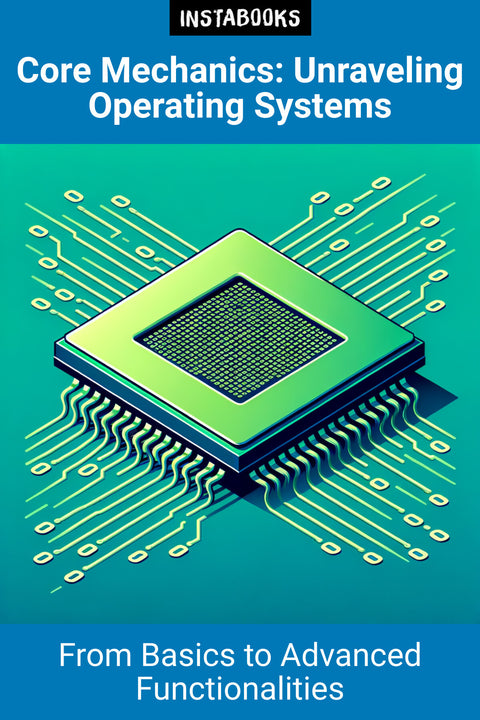
Core Mechanics: Unraveling Operating Systems
From Basics to Advanced Functionalities
Included:
✓ 200+ Page AI-Generated Book
✓ ePub eBook File — read on Kindle & Apple Books
✓ PDF Print File (Easy Printing)
✓ Word DOCX File (Easy Editing)
✓ Hi-Res Print-Ready Book Cover (No Logo Watermark)
✓ Full Commercial Use Rights — keep 100% of royalties
✓ Publish under your own Author Name
✓ Sell on Amazon KDP, IngramSpark, Lulu, Blurb & Gumroad to millions of readers worldwide
$149.00
$299.00
Title
Dive into the foundational principles and advanced concepts of operating systems with our comprehensive guide, 'Core Mechanics: Unraveling Operating Systems - From Basics to Advanced Functionalities'. Ideal for readers from novice tech enthusiasts to seasoned software professionals, this book provides a multifaceted examination of the field. Each chapter systematically builds your understanding, beginning with fundamental concepts and steadily progressing to in-depth explorations of complex operations. The book is peppered with practical examples, real-world applications, and expert insights that bring the theory to life. Armed with this resource, you will master operating systems' inner workings and practical applications.
- Defining Operating Systems: Purposes and Principles
- History and Evolution of Modern Operating Systems
- Types of Operating Systems and Their Uses
2. The Boot Process: Starting Up Your System
- From Power-On to Bootloader: The Initial Steps
- Delving into BIOS and UEFI: Understanding Firmware
- The Role of the Kernel during System Startup
3. Memory Management: The Art of Allocation
- Fundamentals of Memory Hierarchy
- Advanced Memory Allocation Techniques
- Virtual Memory: Concepts and Implementation
4. Process Scheduling: The Orchestra of Tasks
- Understanding Process and Thread Basics
- Scheduling Algorithms: Priorities and Performance
- Multi-threading and Concurrency: Challenges and Strategies
5. File Systems: Organizing Data
- The Blueprint of File Systems: Structure and Function
- File System Types and Attributes
- Security and Permissions: Protecting Data Integrity
6. Interprocess Communication: The Collaboration
- Mechanisms of Interprocess Communication (IPC)
- Synchronization and Deadlock Prevention
- Pipes, Sockets, and Shared Memory Techniques
7. System Calls and API: Bridging the User and Kernel Space
- The Fundamentals of System Calls
- API Layers: Interfaces for Application Development
- Case Studies: System Call Implementation in Various OS
8. Security in Operating Systems: Safeguarding Information
- Fundamental Security Concepts and Threats
- Authentication and Authorization Mechanisms
- Cryptography and Operating System-Level Defense
9. Input/Output Management: Communicating with Hardware
- I/O System Overview: Devices and Drivers
- Buffering, Spooling, and Device Management
- Optimizing I/O Performance: Techniques and Challenges
10. Advanced Input/Ouput: Managing Complex Systems
- RAID Levels and Their Implications
- SAN and NAS Configurations for Enterprises
- High Availability and Fault Tolerance in I/O Management
11. Networking and Operating Systems: The Interconnected Era
- Networking Basics within the OS Environment
- Design and Management of Network Protocols
- Integration of Distributed Systems and Cloud Infrastructure
12. Future of Operating Systems: Emerging Technologies and Concepts
- Innovations in Operating System Design
- Impact of Artificial Intelligence and Machine Learning
- Challenges and Opportunities in Next-Generation Operating Systems
Table of Contents
1. Understanding the Core: An Introduction to Operating Systems- Defining Operating Systems: Purposes and Principles
- History and Evolution of Modern Operating Systems
- Types of Operating Systems and Their Uses
2. The Boot Process: Starting Up Your System
- From Power-On to Bootloader: The Initial Steps
- Delving into BIOS and UEFI: Understanding Firmware
- The Role of the Kernel during System Startup
3. Memory Management: The Art of Allocation
- Fundamentals of Memory Hierarchy
- Advanced Memory Allocation Techniques
- Virtual Memory: Concepts and Implementation
4. Process Scheduling: The Orchestra of Tasks
- Understanding Process and Thread Basics
- Scheduling Algorithms: Priorities and Performance
- Multi-threading and Concurrency: Challenges and Strategies
5. File Systems: Organizing Data
- The Blueprint of File Systems: Structure and Function
- File System Types and Attributes
- Security and Permissions: Protecting Data Integrity
6. Interprocess Communication: The Collaboration
- Mechanisms of Interprocess Communication (IPC)
- Synchronization and Deadlock Prevention
- Pipes, Sockets, and Shared Memory Techniques
7. System Calls and API: Bridging the User and Kernel Space
- The Fundamentals of System Calls
- API Layers: Interfaces for Application Development
- Case Studies: System Call Implementation in Various OS
8. Security in Operating Systems: Safeguarding Information
- Fundamental Security Concepts and Threats
- Authentication and Authorization Mechanisms
- Cryptography and Operating System-Level Defense
9. Input/Output Management: Communicating with Hardware
- I/O System Overview: Devices and Drivers
- Buffering, Spooling, and Device Management
- Optimizing I/O Performance: Techniques and Challenges
10. Advanced Input/Ouput: Managing Complex Systems
- RAID Levels and Their Implications
- SAN and NAS Configurations for Enterprises
- High Availability and Fault Tolerance in I/O Management
11. Networking and Operating Systems: The Interconnected Era
- Networking Basics within the OS Environment
- Design and Management of Network Protocols
- Integration of Distributed Systems and Cloud Infrastructure
12. Future of Operating Systems: Emerging Technologies and Concepts
- Innovations in Operating System Design
- Impact of Artificial Intelligence and Machine Learning
- Challenges and Opportunities in Next-Generation Operating Systems
